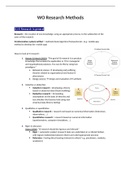WO Research Methods
(1) IS Research in general
Research = the creation of new knowledge, using an appropriate process, to the satisfaction of the
users of the research.
IS (information system) artifact = methods/tools/algoritms/framworks/etc. (e.g.: mobile app,
method to develop the mobile app)
Ways to look at IS research:
1. Hevner & March (2003): “The goal of IS research is to produce
knowledge that enables the application or IT for manegerial
and organizational purposes. You can do this by using two
paradigms:”
a. Behavioral science developing and justifying
theories related to organizational and human IS
phenomena
b. Design science design and evaluation of IS artifacts
2. Inductive vs deductive
Inductive research = developing a theory
based on observed data (theory-building)
Deductive research = formulating
assumptions on the basis of theories and
test whether the theories hold using new
empirical data (theory-testing)
3. Qualitative vs quantitative
Qualitative research = research not based on numerical information (interviews,
observations, …)
Quantitative research = research based on numercal information
(questionnaires, computer simulations, …)
4. Rigor & relevance
Oates (2006): “IS research should be rigorous and relevant”
Rigor = systematic conduct (research tasks are undertaken in a rational fashion,
with logical relationships between them) and valid (appropriate process)
Relevance = having direct bearing (relevant to whom? e.g. practioners, students,
academics)
, (2) Research ethics
All participants (including directly linked people, the researchers, and indirectly linked people) should
be treated fairly and with honesty.
Rights of the participants:
The researcher could ask if he
- Right to not participate can put it in the research by
- Right to withdraw offering anonymity.
- Right to anonymity
- Right to confidentiality (tell you something that may not end up in the research)
- Right to give informed consent (with a consent form)
Participants give their consent only when they If you want to observe people You don’t always want to give
are fully informed of the research’ nature without them knowing it, it is only away your exact research
(purpose, researchers, sponsors, what is involved ethical If your observations take purpose so: don’t exactly
in it, whether they receive a reward, how their place in a public setting where tell what you will investigate,
data will be used). Obtaining informed consent is people are aware that their actions but present and put it more
not a one-off event at the start of your research; can be seen by others. broader.
you should keep your participants updated
Responsibilities of an ethical researcher:
No unnecessary intrusion: knowledge that you’re looking for should not already be available.
Also, you shouldn’t ask questions for which you don’t really need the answers.
Behave with integrity: you shouldn’t keep quiet about data that doesn’t support your case or
try to manipulate data the way you want it to be. And, don’t publish your research if the
outcomes could harm other people. Also, be clear about who sponsored the research.
Follow appropriate professional codes of conduct
No plagiarism (including self-plagiarism)
Be an ethical reviewer: carry out a prompt/short review, don’t use the content you read if
the paper isn’t published yet, and try to find at least one positive thing about the paper you
review.
Unethical temptations for researchers using the ‘design and creation’ strategy:
Ease of access and copying: this way, data collected about people can easily be used for
another reason without permission.
Ease of privacy and anonymity: it’s less likely that wrongdoers will be caught due to the
software and computers in public spaces.
New means of data gathering: tiny cameras, website cookies etcetera ease data gathering
without people’s permission.
Internet and ethics: ensuring confidentiality or anonymity over the internet is difficult. But just treat
people online the same way as offline, check the website policies of using their data, and be guided
by the codes of conduct for internet research.
By the way, the different philosophical paradigms (you will read about them soon) have different
assumptions about ethical behaviour. E.g., in ethical research, participants are seen as co-
researchers, so putting them in the report as anonymous belittles their contribution.





